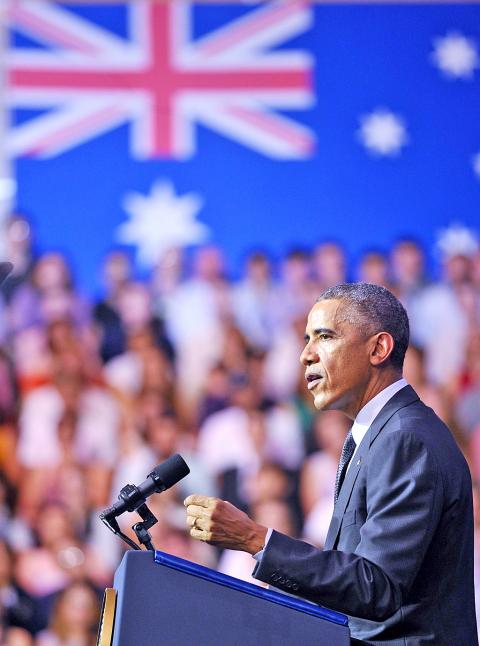US President Barack Obama sought yesterday to reassure Asia-Pacific allies about Washington’s strategic shift toward the region as he sent a veiled message to China with a vow to “deepen our engagement using every element of our power.”
Speaking at the University of Queensland in Brisbane, Australia, where he is attending a G20 summit, Obama insisted that Asia’s security order must not be based on “coercion or intimidation ... where big nations bully the small, but on alliances for mutual security.”
Although Obama did not explicitly point the finger at China, there was little doubt that he was alluding to Beijing’s maritime disputes with its neighbors and growing concern in the region about its military build-up.

Photo: AFP
“No one should ever question our resolve or our commitments to our allies,” he said.
Obama, who visited Beijing for an Asia-Pacific summit this week and held talks with Chinese President Xi Jinping (習近平), sought to show renewed resolve to follow through on his much-touted “pivot” to the region, involving military, diplomatic and economic assets.
The policy is widely seen as intended to counter China’s rising influence, although Obama, at a news conference with Xi earlier in the week, denied there was any desire to contain Beijing.
However, many in Asia are looking for further proof that the policy is real, especially with Obama’s agenda dominated by crises ranging from the battle against Islamic State militants and the conflict in Ukraine, to the spread of Ebola.
Obama made clear that in addition to security, Washington is determined to expand trade, a goal underscored by efforts to forge a trans-Pacific trade partnership in difficult negotiations that so far exclude China.
However, even as Obama hailed the region’s “dynamism,” he warned of potential threats.
“We see dangers that could undermine this progress,” he said, citing North Korea’s nuclear and missile programs, disputes over territory that threaten to spiral into confrontation and the failure to uphold universal human rights.

US President Donald Trump yesterday announced sweeping "reciprocal tariffs" on US trading partners, including a 32 percent tax on goods from Taiwan that is set to take effect on Wednesday. At a Rose Garden event, Trump declared a 10 percent baseline tax on imports from all countries, with the White House saying it would take effect on Saturday. Countries with larger trade surpluses with the US would face higher duties beginning on Wednesday, including Taiwan (32 percent), China (34 percent), Japan (24 percent), South Korea (25 percent), Vietnam (46 percent) and Thailand (36 percent). Canada and Mexico, the two largest US trading

AIR SUPPORT: The Ministry of National Defense thanked the US for the delivery, adding that it was an indicator of the White House’s commitment to the Taiwan Relations Act Deputy Minister of National Defense Po Horng-huei (柏鴻輝) and Representative to the US Alexander Yui on Friday attended a delivery ceremony for the first of Taiwan’s long-awaited 66 F-16C/D Block 70 jets at a Lockheed Martin Corp factory in Greenville, South Carolina. “We are so proud to be the global home of the F-16 and to support Taiwan’s air defense capabilities,” US Representative William Timmons wrote on X, alongside a photograph of Taiwanese and US officials at the event. The F-16C/D Block 70 jets Taiwan ordered have the same capabilities as aircraft that had been upgraded to F-16Vs. The batch of Lockheed Martin

GRIDLOCK: The National Fire Agency’s Special Search and Rescue team is on standby to travel to the countries to help out with the rescue effort A powerful earthquake rocked Myanmar and neighboring Thailand yesterday, killing at least three people in Bangkok and burying dozens when a high-rise building under construction collapsed. Footage shared on social media from Myanmar’s second-largest city showed widespread destruction, raising fears that many were trapped under the rubble or killed. The magnitude 7.7 earthquake, with an epicenter near Mandalay in Myanmar, struck at midday and was followed by a strong magnitude 6.4 aftershock. The extent of death, injury and destruction — especially in Myanmar, which is embroiled in a civil war and where information is tightly controlled at the best of times —

China's military today said it began joint army, navy and rocket force exercises around Taiwan to "serve as a stern warning and powerful deterrent against Taiwanese independence," calling President William Lai (賴清德) a "parasite." The exercises come after Lai called Beijing a "foreign hostile force" last month. More than 10 Chinese military ships approached close to Taiwan's 24 nautical mile (44.4km) contiguous zone this morning and Taiwan sent its own warships to respond, two senior Taiwanese officials said. Taiwan has not yet detected any live fire by the Chinese military so far, one of the officials said. The drills took place after US Secretary